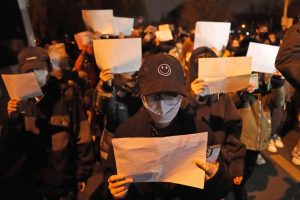Protests in China over the Zero-COVID policy spread from President Xi Jinping’s alma mater Tsinghua University to the streets of cities across the nation. The “White Paper Protests,” as they became known, took their cue from the Be Water movement in Hong Kong to hinder identification of the ringleaders and minimize non-compliance with the law, hence reducing the risk of arrest. While contact with some leaders of the movements and other individuals who voiced opposition to the Xi administration has reportedly been lost, for the most part members of the public who took part in the White Paper Protests do not appear to have been detained.
The concentration of Chinese government power in the hands of Xi Jinping means that Xi himself is in the firing line of anti-government or anti-party movements. The more concentrated the power, the more Xi himself will bear the brunt of public discontent, even in the absence of explicit cooperation between individual regions. Yet the Xi administration did not clamp down on the protest movements. Some observers saw this as a show of resilience on the part of the government, demonstrating its ability to determine an appropriate response to demands from society. In reality, the Xi administration has been under pressure to address a raft of challenges, including easing the Zero-COVID policy, getting economic recovery measures in place, and dealing with rising unemployment. When it came to the shift in COVID policy, Hong Kong was a step ahead of the mainland, said to be the result of successful lobbying of Beijing by the Hong Kong business community.
The policy adopted by the Xi administration was not to “ease” the Zero-COVID policy. Rather, it was to downgrade COVID-19 from a Class A to a Class B infectious disease on January 8, thus putting an end to the policy altogether. China’s policy now is to go from Zero-COVID to living with COVID, and the government has refused to concede that the Zero-COVID policy was a failure. Rather, its logic is that the success of the Zero-COVID policy means it now makes sense that it be discontinued. In reality, even under Zero-COVID, both the Delta and Omicron strains did spread throughout the country. If, as some argue, China has drawn on Hong Kong’s example, it failed to take into account the fact that, outside the major cities, healthcare systems on a par with those in Hong Kong are all but non-existent in mainland China. As a result, China is seeing a rampant spread of infections and a drastic increase in deaths. Of course, the Chinese government does not publicly acknowledge this rise in mortality and continues to insist that its former policy was a success.
So what was really behind the timing of this policy shift by the Chinese government? First, it allows herd immunity to be achieved by the time the National People’s Congress is held in March 2023. Huge numbers were already infected before the mass migration of people back to their hometowns around the Chinese New Year on January 22, and infections are likely to peak from now into early February, potentially becoming contained one month later in early March.
Second, it may be that China had been waiting for the right time to institute a policy turnaround amid a raft of economic warning signs. Challenges such as economic recovery and unemployment meant that at some point, the country had to adopt an economy-first policy. China may have been waiting for an opportune moment.
Third, the White Paper Protests that occurred in November 2022 were likely a significant contributor. Even if the easing of the Zero-COVID policy in response to these protest movements resulted in a high death toll, the policy could be justified by the administration on the basis that it was done in response to public demand. The protests may have provided Xi with the cover he needed to make the change in policy. This may be regarded as yet another instance of exploiting a situation to deflect blame away from the government, the same way the Chinese government frequently exploits international opposition and internal protest movements.
China has not renounced the Zero-COVID policy, and understandably has not acknowledged issues with Chinese vaccines. Achieving herd immunity with inadequate healthcare systems involves considerable sacrifice, with people suffering from underlying health conditions especially vulnerable. Uncertainty around the approval of Chinese vaccines and the problem of potential new variants in China are making other countries cautious about accepting travelers from China, even as the latter opens up for international travel. There is also rising discontent within China at the escalating death toll. It remains to be seen whether the Xi administration will sit idly by and watch the toll of the pandemic rise, while continuing to trumpet the success and achievements of its Zero-COVID policy.
KAWASHIMA Shin is a professor at the University of Tokyo.

































